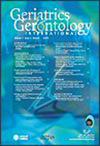Relationship between the number of remaining teeth and postoperative delirium in patients after gastrointestinal surgery
Abstract
Aim
Malnutrition is reportedly associated with the development of delirium. As dental health is essential for nutritional intake, tooth loss may be a risk factor for the development of delirium. This study aimed to investigate the relationship between postoperative delirium and the number of remaining teeth in patients undergoing gastrointestinal surgery.
Methods
This retrospective study included 453 consecutive patients aged ≥65 years who underwent programmed gastrointestinal cancer surgery under general anesthesia at the Department of Surgery, Fujita Health University Hospital, between January 2022 and December 2022. Background factors were prepared between the participants with and without dental intervention. In the dental intervention group, associations between background and surgical factors and the presence of postoperative delirium were explored. Factors with significant associations with postoperative delirium in the univariate analysis were subjected to logistic regression analysis to determine their association with the number of remaining teeth.
Results
Overall, 189 participants underwent postoperative management. They had a significantly lower Prognostic Nutritional Index and higher cognitive decline than the 264 patients who underwent no dental intervention during this period. However, no significant difference was observed in the incidence of postoperative delirium between the two groups. In the dental intervention group, logistic regression analyses revealed that postoperative complications and the number of remaining teeth were significantly associated with postoperative delirium development.
Conclusion
The results revealed that a decrease in the number of remaining teeth is associated with postoperative delirium. The cause of this is not clear, but it is thought to be related to brain fragility. Geriatr Gerontol Int 2025; 25: 90–95.


 求助内容:
求助内容: 应助结果提醒方式:
应助结果提醒方式:


